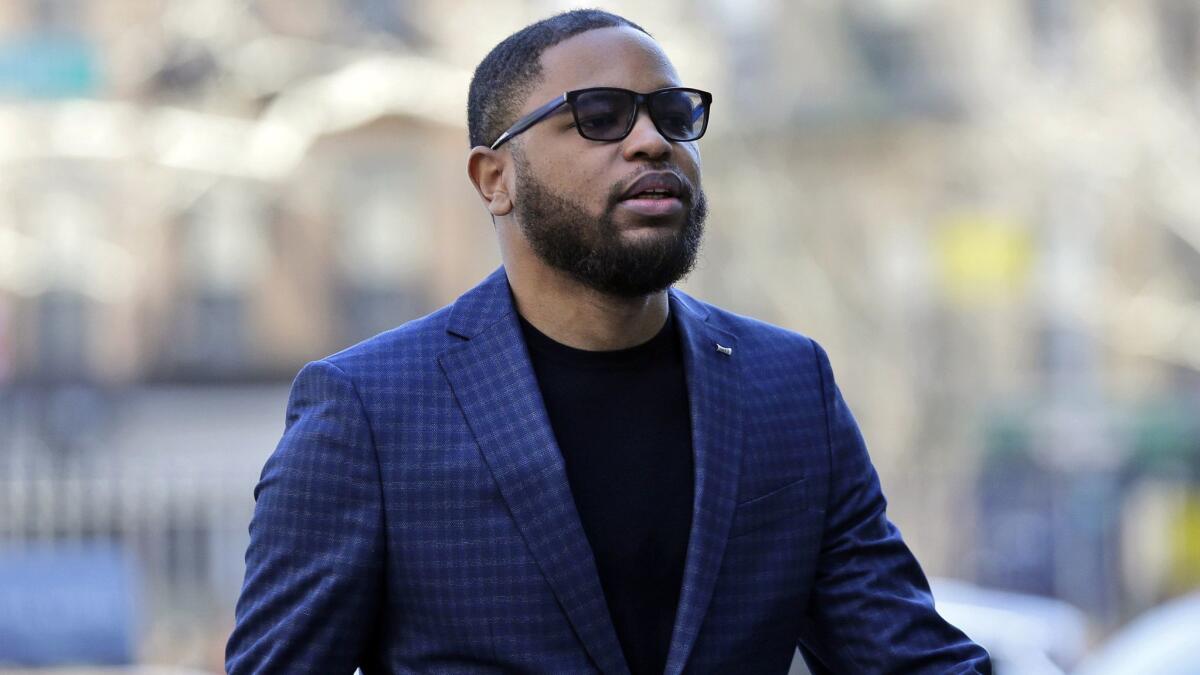Christian Dawkins convicted of bribery conspiracy in college basketball scandal

- Share via
The chief executive of a fledgling sports management company and a former Adidas employee were convicted Wednesday of bribing coaches to steer players to the firm, the final active case in the long-running federal probe into college basketball corruption.
The jury in U.S. District Court in New York found Christian Dawkins guilty of bribery and conspiracy to commit bribery from efforts — some recorded by cameras, wiretaps or undercover FBI agents posing as investors — to lure clients to the company he founded.
Merl Code, a longtime Nike employee before joining Adidas, was convicted on a single count of conspiracy to commit bribery.
The investigation became public with a series of high-profile arrests by the FBI in September 2017 and, for a time, seemed destined to upend college basketball. In the end, however, the probe ensnared only Dawkins, an ambitious middleman who isn’t well known outside of the sport, four assistant coaches and a handful of others.
“And while their convictions mark the culmination of the criminal charges announced by this Office in September 2017,” U.S. Attorney Geoffrey S. Berman said in a statement, “they should also make clear to those who might be tempted to engage in the sort of misconduct these prosecutions have only begun to expose: that bribery is a crime, one this Office is prepared to charge criminally and prosecute to the full extent of the law.”
Sign up for our daily sports newsletter »
The jury acquitted Dawkins and Code on a combined seven counts centered on allegations the men defrauded Arizona, USC and several others schools.
“Not guilty on four of six counts offers us some degree of satisfaction,” Steve Haney, the Michigan-based attorney for Dawkins, told the Los Angeles Times. “The only real victims in any of this continue to be the student-athletes making schools hundreds of millions of dollars … and receiving no monetary consideration for their labor.”
Three former assistant coaches charged in the case — Arizona’s Book Richardson, Oklahoma State’s Lamont Evans and USC’s Tony Bland — pleaded guilty this year as part of deals with prosecutors. They’ll be sentenced later this spring.
Code, Dawkins and Jim Gatto, another Adidas employee, were sentenced to prison in March after being convicted last year of conspiracy to commit wire fraud in connection with paying families of players at Kansas, Louisville and North Carolina State. All received sentences much shorter than what prosecutors recommended, something seen by defense attorneys as undercutting government claims about the seriousness of what occurred.
A third trial linked to the investigation had been scheduled for June, but former Auburn assistant coach Chuck Person accepted a plea bargain and, earlier this week, clothier Rashan Michel did the same.
The financial advisor linked to the scheme, Munish Sood, and an amateur basketball coach, T.J. Gassnola, previously pleaded guilty and cooperated with prosecutors.
The two-week trial of Dawkins and Code did little to pull bigger names into the investigation.
Efforts by Haney to compel Arizona head coach Sean Miller and Louisiana State head coach Will Wade to testify weren’t successful. Perhaps the most dramatic moment involved the playing of a wiretapped phone call between Dawkins and Richardson where the former Arizona assistant alleged Miller was paying star Deandre Ayton $10,000 a month.
No evidence directly linking Miller to the purported payments was presented.
After several days of testimony about discreet meetings with coaches and bribe money provided by undercover FBI agents, Dawkins took the stand in his own defense. He said the idea to pay college coaches to direct their players to use the sports management company came from one of the undercover FBI agents posing as an investor.
“The players are being paid and also are involved with people who have the influence over them well before they get to college,” Dawkins testified. “So to pay someone who they are going to be with on campus for six months, who’s probably also paid somebody else to get them, it wouldn’t even make common sense to pay a college basketball coach. They don’t have the influence needed to deliver the player to you.”
The case exposed emails, text messages and recorded meetings detailing plans to pay elite players or their handlers. During a discussion with attorneys last week, Judge Edgardo Ramos steered questioning away from reasons college players or their associates might be paid. The NCAA regulation against such payments was at the heart of the government’s legal argument.
“There are, as you’ve indicated, any number of reasons why families and players get paid,” Ramos said, according to a transcript. “None of them good.”
Some of the government’s allegations fell apart.
It was asserted that Bland got a $13,000 bribe from an undercover FBI agent posing as an investor during a July 2017 meeting. Undercover video played at the trial showed Dawkins pocketing the stack of cash. Bank records and testimony at the trial chronicled how Dawkins deposited most of the money in his bank account.
He gave Bland, who pleaded guilty in January to a felony count of conspiracy to commit bribery, a couple of thousand dollars in cash to use at a club.
More to Read
Go beyond the scoreboard
Get the latest on L.A.'s teams in the daily Sports Report newsletter.
You may occasionally receive promotional content from the Los Angeles Times.











